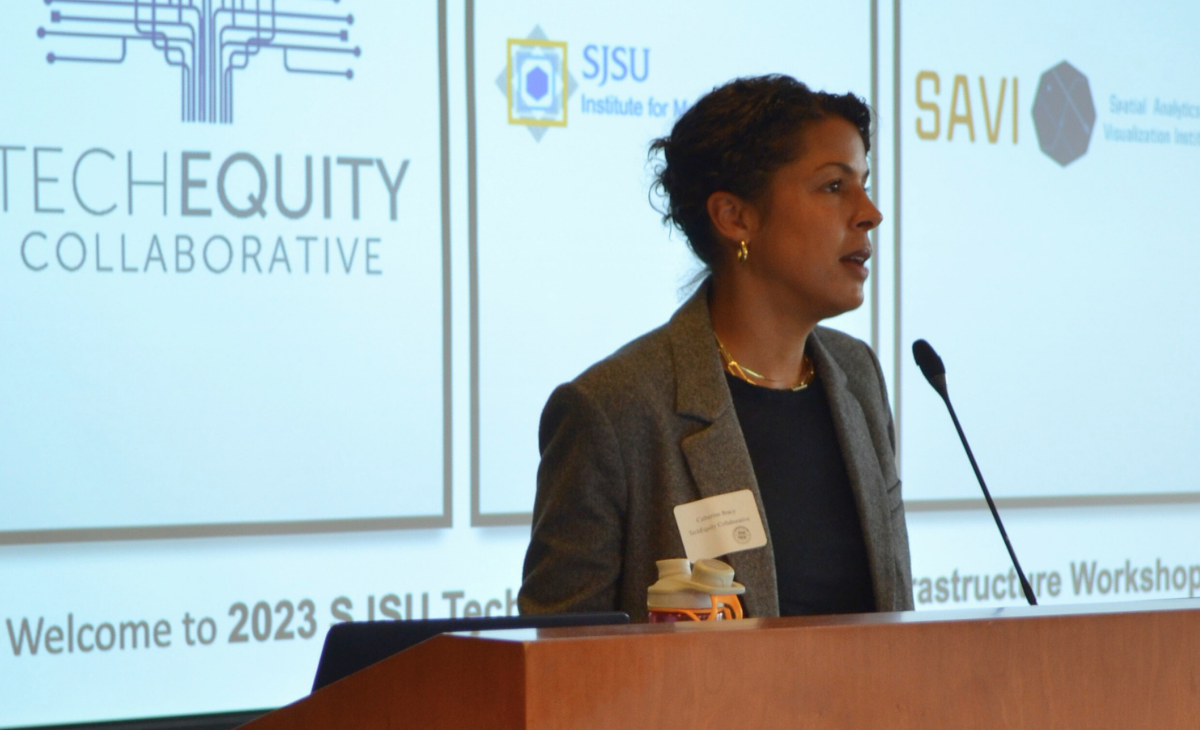2023 in Review: A Letter from Catherine Bracy

In just one year, AI has dramatically shifted the tech landscape. Generative AI models like ChatGPT exploded onto the scene in 2023, making theoretical conversations about “the future of work” real in an instant. While AI has demonstrated potential for addressing some of the greatest challenges facing humankind, its development and deployment come with significant risks. Automation and algorithms have the potential to enhance the human experience, making us more prosperous and unlocking human potential—but only if we ensure that the people who are most affected by it have a say in its use.
For TechEquity, 2023 was a year to reorient our work to address the impacts of this game-changing technology on our economy. Much of that meant amplifying work we were already doing in our Contract Worker Disparity Project and the Tech, Bias, and Housing Initiative. But we also began engaging in the national conversation around AI in ways that were new for us. We partnered with advocates across the country to write letters to Congress, Biden, and more to ensure the needs of workers and renters are centered in the forthcoming regulation of automation, algorithms, and AI. When President Biden issued the Executive Order on Safe, Secure, and Trustworthy AI, we knew that these collective efforts did not go unnoticed.
Automation and algorithms have the potential to make work and lives easier, to be sure. However, there’s a lot of work to be done to ensure it can be a force for enabling human flourishing rather than undermining it.
We see how tech left to its own devices can impact our well-being, our politics, and society at large. That’s why our collective approach to AI needs to be different—we need experts and advocates to move together to match the scale and speed of this emerging technology, to establish guardrails that proactively shape its direction towards equity.
Despite the importance of AI, we didn’t want it to pull our attention away from critical and persistent equity issues in tech. Between mass layoffs and a litany of discrimination incidents, it has become clear that our current worker protections aren’t meeting the needs of workers today. To advance equity within the tech workforce, we took to Sacramento. There, we championed two key bills that would have supported workers on the margins. The Protect Laid-Off Workers Act, AB 1356, would have ensured that everyone, especially contract workers, would be protected in the face of a sudden mass layoff. The Ending Caste Discrimination Act, SB 403, would have explicitly protected workers and residents against caste discrimination, a practice that’s alive and well in California. Together with workers, partners, and lawmakers, we successfully carried both bills through the Legislature. While Governor Newsom, unfortunately, vetoed both bills, getting both of them to his desk is a testament to the strength of the coalitions we have been able to build. We are more committed than ever to making California and the tech industry safer places to work and live.
In 2023 we also delved deeper into how tech is shaping the housing crisis. We released a report summarizing a year of research for the Tech, Bias, and Housing Initiative, exploring how Proptech impacts renters and would-be homeowners, from tech bias in screening and alternative financing pitfalls to housing corporatization and venture capital pressures. We also teamed up with the National Fair Housing Alliance to explore how to protect privacy and the right to housing in an increasingly digital world.
It’s clear that as the tech industry changes, we need to adapt to meet the occasion. And so we reflected on the last three years of our work and reshaped the org with our new strategic plan— with more clarity and purpose than ever before.
2024 is already shaping up to be our busiest year yet:
- With our unique position at the intersection of tech, housing, and labor, we’re bringing together experts across the labor, civil rights, economic equity, and privacy communities to ensure that AI enables broad-based prosperity, rather than hindering it.
- Building on our existing research, we’re working in coalition with trusted partners to center contract workers’ voices and strengthen their rights and protections in California.
- We’re investigating the role algorithms play in the housing space, working with impacted people to amplify their stories, and building partnerships to craft + advance PropTech policy that benefits everyday people.
- We’re diving into the world of housing data to make the case for publicly accessible rental data, build tools to support renters, and address power imbalances in housing data asymmetries in California.
None of this work would be possible without our community. I’m grateful you’re here with us, and I’m so excited for what’s to come.

Catherine Bracy, CEO and Co-Founder of TechEquity Collaborative
